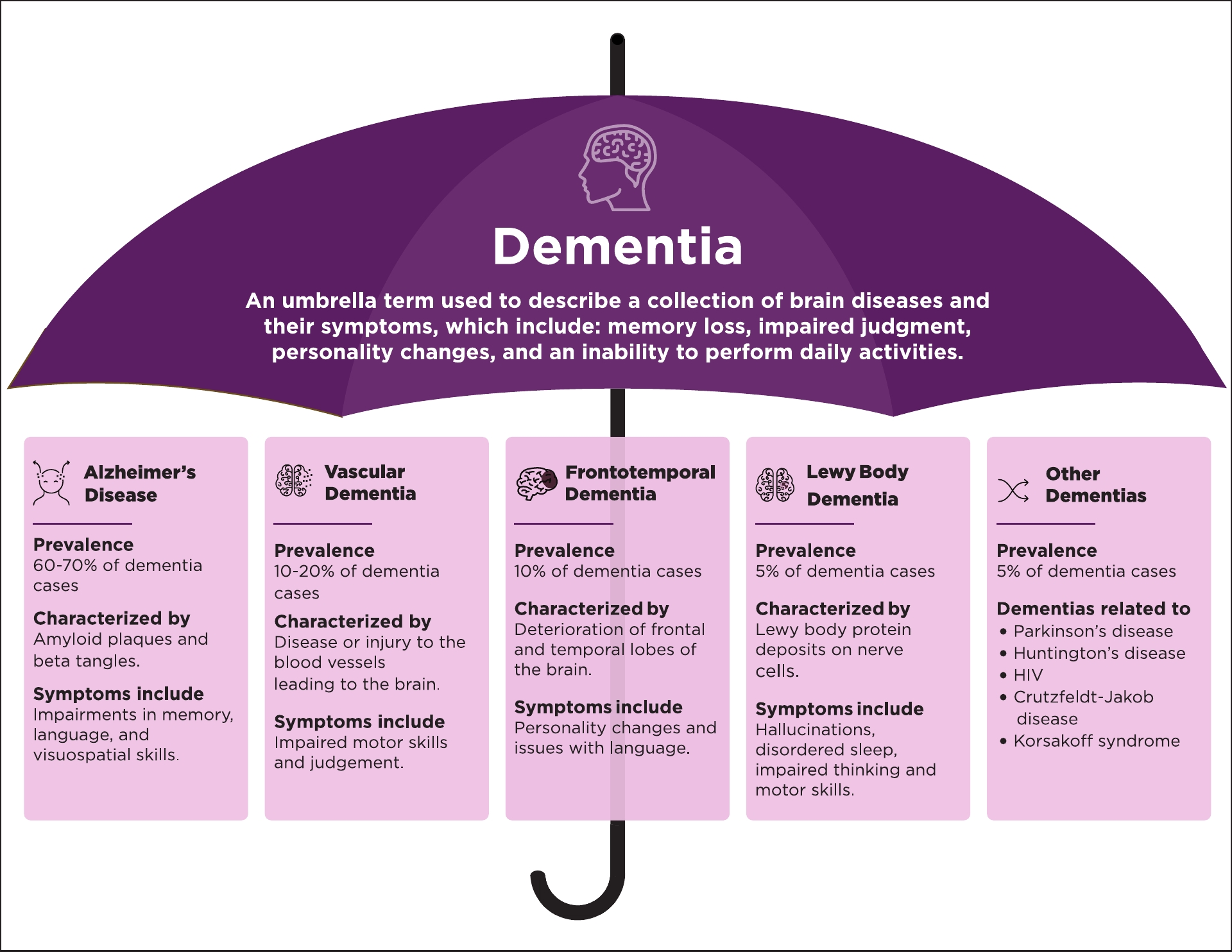Dementia’s Potential Causes
Damage or changes to the brain bring about dementia in individuals. Most people associate this disease with memory loss, but a person suffering from dementia may also have problems with their thinking or notice a decline in their social abilities. The symptoms interfere with daily life to some extent. What causes dementia, and is there any hope for people suffering from this disease?Â
What Causes Dementia?
When nerve cells or the connections between nerve cells in the brain sustain damage or are destroyed, a person may be diagnosed with dementia. The symptoms exhibited as a result of this loss or damage differ by the part of the brain that has been harmed. When a doctor diagnoses a person with this disease, they identify the type of dementia by the area of the brain that is affected or the proteins present in the brain.Â
This diagnosis becomes of great importance, as a person showing signs of dementia may not need a memory care center. They could be having a reaction to a medication they take or suffering from a vitamin deficiency. The right treatment may alleviate the symptoms attributed to dementia and allow them to continue living as they did before the symptoms appeared.Â
Progressive Dementias
Certain dementias progress with time. Treatment will not reverse these conditions. The following diseases serve as the most common progressive dementias today.Â
Alzheimer’s Disease
Alzheimer’s disease remains the most common dementia cause today. While researchers continue to look for the causes of this disease, certain types come from mutations to three genes. These genes may be passed down in a family. Apolipoprotein E or APOE likewise increases the risk of Alzheimer’s.Â
A person with Alzheimer’s disease has tangles and plaque present in their brain. The plaque consists of beta-amyloid, a protein that clumps together. Tau protein forms the fibrous tangles seen with this disease. The clumps harm healthy neurons in the brain along with the fibers that join them together.Â
Vascular dementia, in contrast, occurs when the vessels responsible for supplying blood to the brain sustain damage. Individuals who find it difficult to solve problems might have vascular dementia. They may no longer be able to focus or become disorganized. Their thinking slows, and these symptoms are typically more noticeable than those related to memory loss. Any problem with blood vessels supplying the brain can lead to a stroke or cause other issues, such as damage to fibers present in the brain’s white matter.Â
Lewy Body Dementia
Individuals with Lewy body dementia develop abnormal clumps of protein in the brain. These clumps resemble balloons and are also found in those suffering from Parkinson’s disease and Alzheimer’s. When a person acts out a dream in their sleep, they may have this form of dementia. Visual hallucinations, slow or uncoordinated movements, tremors, rigidity, and problems with attention and focus have also been reported.Â
Frontotemporal Dementia
When nerve cells and their connections break down in the frontal and temporal lobe portions of the brain, the person may have frontotemporal dementia. Symptoms seen with this form of dementia include changes in personality, behavior, judgment, movement, language, and thinking. A memory care community helps these individuals by allowing them the maximum freedom they can handle based on their health status.Â
Mixed Dementia
Individuals 80 years of age and older often have multiple issues contributing to their dementia. Researchers discovered this upon the completion of autopsies in older men and women. The researchers continue to study how having multiple types of dementia affects the symptoms seen and the preferred treatments.Â
Dementia-Linked Disorders
Individuals with Huntington’s disease experience a sharp decline in their cognitive skills in their 30s and 40s. A genetic mutation causes the deterioration of nerve cells in the brain and spinal cord, leading to the symptoms seen with this disorder. A person may need to reside in assisted living apartments so they can remain independent as long as possible and the progression of the disease is monitored
A traumatic brain injury often results from repeated trauma to the head. Individuals who play contact sports have a higher incidence of this type of injury. When specific parts of the brain are injured, the individual exhibits symptoms of explosiveness, impaired speech, depression, and memory loss. In addition, a person might develop parkinsonism. These symptoms often take years to appear.Â
People with no known risk factors for dementia may suffer from a rare brain disorder known as Creutzfeldt-Jakob disease. Doctors believe infectious proteins known as prions might cause this fatal condition that generally appears after a person’s 60th birthday. People inherit this disease or it could arise following exposure to diseased brain or nervous system tissue.Â
Anyone showing symptoms of dementia should see a doctor immediately. The doctor determines whether this is actually dementia or symptoms of another disease or injury, such as a subdural hematoma. Prompt action ensures the person receives care for whatever condition they have.Â
About Vista at Simi Valley:
A new assisted living community, Vista at Simi Valley, provides residents with a homelike environment in a neighborhood setting. The apartments feature modern amenities in a non-medical environment. Residents benefit from a range of activities and programs with dedicated caregivers on hand to assist them with their needs.Â





